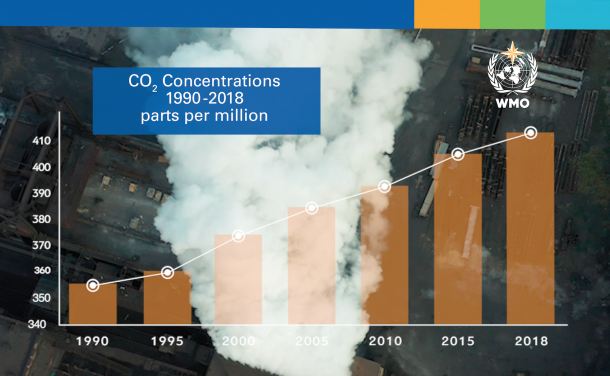The World Meteorological Organization reports of a new GHG-emissions level that “have reached another new record high“, meaning that future generations will experience the severe impacts of climate change, including rising temperatures, extreme weather conditions, sea level increase, as well as disruption to marine and land ecosystems.
The recently-launched WMO Greenhouse Gas Bulletin revealed that the global averaged concentrations of CO2 reached the 407.8 parts per million in 2018, up from 405.5 parts per million (ppm) in 2017.
According to the Bulletin, the rise in CO2 from 2017 to 2018 was very similar to that observed from 2016 to 2017 and just above the average over the last decade. Global levels of CO2 crossed the symbolic and significant 400 parts per million benchmark in 2015.
From 1990 the world has experienced a 43% increase in total radiative forcing by long-lived greenhouse gases; Thus, CO2 remains in the atmosphere for centuries and in the oceans for even longer.
In light of these developments, Secretary General of WMO, Petteri Taalas commented that
We need to translate the commitments into action and increase the level of ambition for the sake of the future welfare of the mankind. It is worth recalling that the last time the Earth experienced a comparable concentration of CO2 was 3-5 million years ago. Back then, the temperature was 2-3°C warmer, sea level was 10-20 meters higher than now.

Carbon Dioxide is the main greenhouse gas, which is the result of human activities. Its concentration reached new highs in 2018 of 407.8 ppm, or 147% of pre-industrial level in 1750.
Methane, coming second as the most important long-lived greenhouse gas, contributes about 17% of radiative forcing. Natural sources, as wetlands and termites produce about 40% of methane, which is emitted to the atmosphere. The remaining 60% is the result of human activities, including cattle breeding, rice agriculture, fossil fuel exploitation, landfills and biomass burning.
Nitrous Oxide is emitted by both antrhopogenic and natural sources, by 40% and 60% respectively. This kind of emission is the result of oceans, soil, biomass burning, fertilizer use, and various industrial processes. The increase from 2017 to 2018 was also higher than that observed from 2016 to 2017 and the average growth rate over the past 10 years.





























































